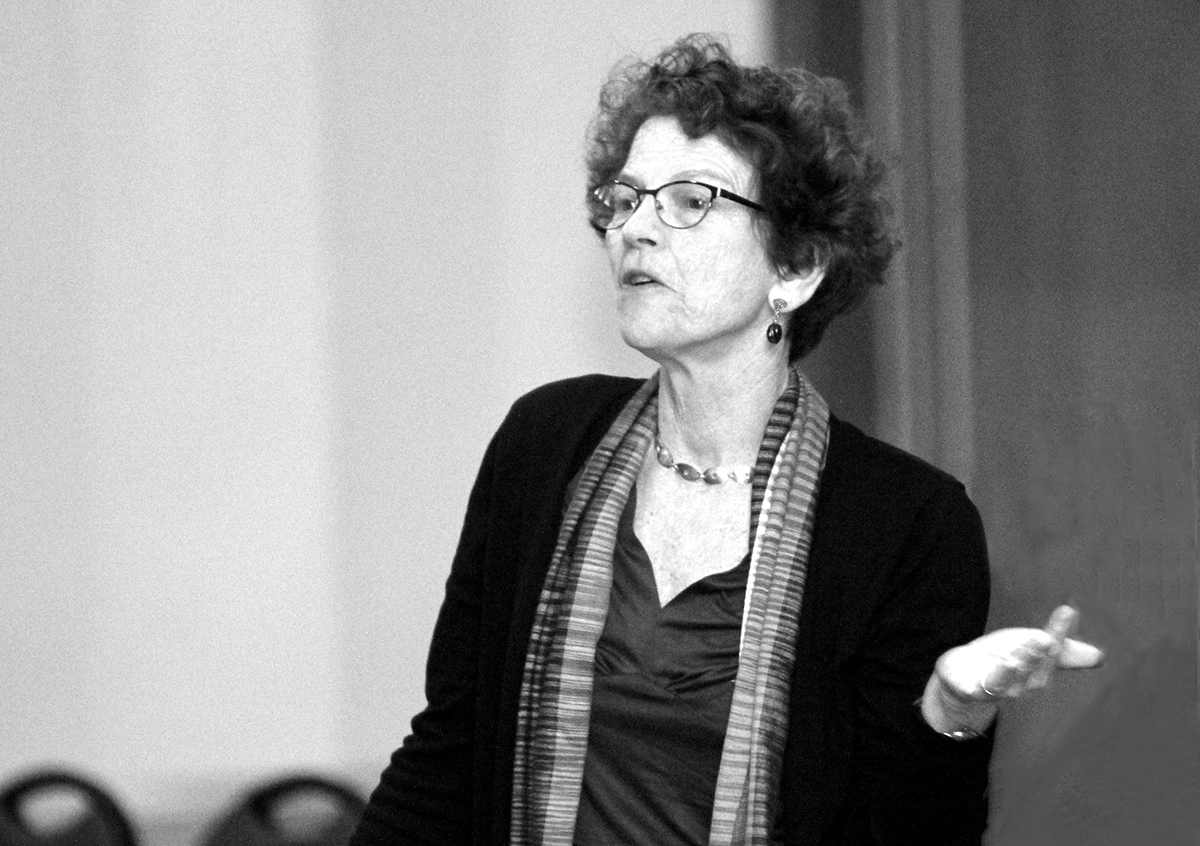
by Margaret Hallock, Director, Wayne Morse Center
The Center for the Study of Women in Society has been a big part of my career at the University of Oregon. I had the honor and pleasure of working with nearly all of the center’s directors—Joan Acker, Cheris Kramarae, Sandra Morgen, and Carol Stabile in particular.
Feminist sociologists greeted me when I joined the economics department faculty in 1974. Although not every economics faculty member appreciated the collaboration, I worked closely with sociologists on classes like “Women in the Economy” and “Women and Unions.” And we all worked on establishing the Center for the Sociological Study of Women, which was the forerunner to CSWS in the sociology department.
These feminists were my staunch supporters when the economics department failed to renew my contract after three years. Students banded together to successfully pressure the department, arguing that they should retain the only woman tenure-track faculty person in the department and one of the better teachers. I accepted a short-term renewal but left the UO in 1978-79 to work at the state level and with the Service Employees International Union. During this time I led the Oregon Task Force on Classification and Compensation Equity, more popularly known as the Comparable Worth Task Force, on a pay equity study and collective bargaining for raises for female-dominated jobs. My friendship with Joan Acker deepened, as she was a participant observer on the task force and wrote about it in her book Doing Comparable Worth.
I returned to the UO in 1988 to direct the Labor Education and Research Center and again renewed the collaboration with CSWS. We conducted research about working women, convened conferences, and taught students on campus and in the community about women in labor unions and the power of collective bargaining and labor solidarity.
But by far the most fruitful collaboration has been between the Wayne Morse Center for Law and Politics and CSWS. Formally established in 2000, we built on the tradition of the endowed Wayne Morse Chair by enriching visits of Morse Chair occupants with conferences, sponsored research, and grants to faculty and community groups on biennial themes of inquiry.
The first major theme that we undertook was “The Rich, The Poor and American Politics,” anchored by Wayne Morse Chairholder Frances Fox Piven. The centerpiece was a major conference in early 2000 on “Welfare, Work and Politics,” cohosted by CSWS. Joan Acker, Sandra Morgen, and I later published an edited book on the same topic. This collaboration helped launch the Women in the Northwest Initiative at CSWS and the fruitful ongoing research by Sandra Morgen, Joan Acker, and others.
In addition to the conference on welfare and work, the Morse Center that same year awarded grants to CSWS affiliates for work on inequality and American politics, including:
• Lynn Stephen and students for work on the history of PCUN, Oregon’s farmworkers union and an associated class.
• Julie Novkov for a series of classes on “Power, Control and Resistance.”
• KLCC reporter Nancy Solomon to supervise student interns to develop radio stories on class and politics and for working with KLCC reporters on a documentary on poverty in Lane County.
• Eugene Weekly and Bijou Cinema for a film series on economic justice.
• Sandra Morgen for a capstone class for students on “Regulating the Poor.”
• Julie Novkov and Gordon Lafer for a series of classes on “Law, Class and Regulation.”
These are the types of fruitful activities that have marked the collaboration between CSWS and the Wayne Morse Center for Law and Politics. Similar lists could be developed for later themes such as “The Ethics of Climate Change,” when we hosted Vandana Shiva; “Indigenous Peoples” theme when we hosted Wilma Mankiller, the first woman Chief of the Cherokee Nation; and “Democracy and Citizenship in the 21st Century” when we supported research and teaching by Michelle McKinley, Lamia Karim, Ellen Herman, Daniel HoSang, and Lynn Stephen.
We capped a recent theme on “Capitalism and the Common Good” with a major conference on “Gender Equity and Capitalism” in 2012. Many CSWS affiliates presented and participated, and we hosted a celebration of Joan Acker and her remarkable career on that exact topic.
It has been a privilege to run a center that has enjoyed the participation of so many scholars and activists concerned about gender and economic and social justice. The University of Oregon should be proud of these centers and their contributions to research, education and community outreach.
—Margaret Hallock has been active in economic and labor policy in Oregon since 1974. She is the founding director of the Wayne Morse Center for Law and Politics and has been coordinating the Wayne Morse Chair since 1988 when she was director of the UO’s Labor Education and Research Center. She also was a member of the faculty in the UO Department of Economics. Dr. Hallock has extensive experience in labor relations and state policy matters. She was the chief economist for the Oregon Public Employees Union, Service Employees International Union 503. She was appointed to chair the state’s Pay Equity Task Force and led the successful pay equity campaign for state employees in the 1980s. Hallock served as senior policy adviser to Oregon Governor Ted Kulongoski for 2003-04 and has been a member of numerous boards and commissions. She has published papers on tax reform, labor unions, women and the economy, and workforce education and training.

